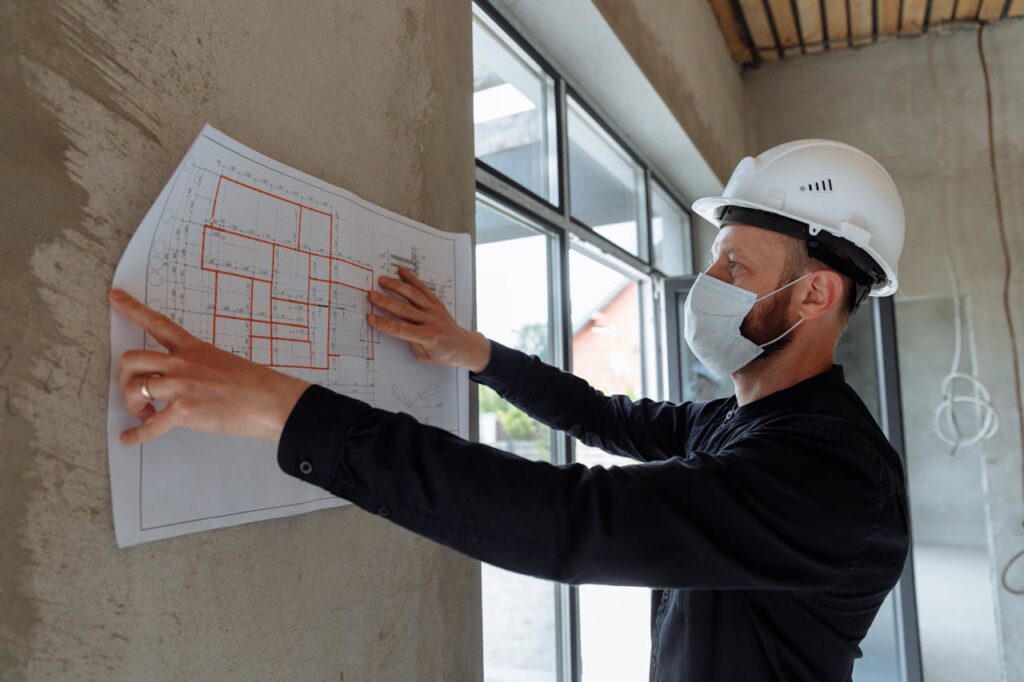The global construction market is projected to exceed $14 trillion by 2025, creating unprecedented opportunities for franchise investment. Construction contractor franchises are franchise systems that deliver building and home services across residential and commercial markets, capitalizing on this explosive growth trajectory.
Interest in construction contractor franchises is particularly high in 2025 because the U.S. construction market is expected to grow significantly, with strong demand from both homeowners and businesses. These franchise systems span restoration, remodeling, and specialized services such as concrete leveling, roofing, plumbing, and energy-efficiency upgrades, positioning investors to capture market share across multiple revenue streams.
Which Construction Contractor Franchise Segments Are Available?

Construction franchise segments span the complete project lifecycle, from initial planning through final restoration. We see opportunities across six core categories that serve both residential and commercial markets.
Construction Consultants
Construction consultants guide owner-builders through complex project management tasks they would otherwise handle alone. These franchises help property owners navigate planning phases, secure permits, coordinate subcontractors, arrange financing, and manage inspections. The model works particularly well for owners who want to save on general contractor markups while maintaining professional oversight of their projects.
We find this segment appeals to franchisees with strong organizational skills rather than hands-on trade experience. The work involves project coordination, vendor relationships, and regulatory compliance rather than physical construction tasks.
Home Inspection Services
Home inspection franchises assess properties against local building codes and safety regulations for buyers and sellers. These services help buyers identify potential issues before purchase and give sellers insight into problems that might affect negotiations. The work requires knowledge of structural systems, electrical codes, plumbing standards, and HVAC functionality.
This segment offers predictable demand tied to real estate transactions. We coordinate inspections during specific transaction phases, making scheduling more predictable than emergency-driven services.
Landscaping And Hardscaping
Landscaping franchises handle plantings, irrigation, and garden design to enhance curb appeal. Hardscaping focuses on non-plant exterior features like retaining walls, patios, walkways, and outdoor structures built with stone, concrete, or lumber. Both services target property value enhancement and outdoor living improvements.
These segments blend aesthetic design with practical construction skills. We manage seasonal demand patterns and weather-dependent scheduling while coordinating with irrigation, lighting, and drainage specialists.
Maintenance And Repair
Maintenance and repair franchises address day-to-day property issues that affect functionality and safety. This includes handyman services, HVAC maintenance, glass repair, electrical troubleshooting, and similar fixes that keep properties operational. The work ranges from minor repairs to preventive maintenance contracts.
We handle both emergency calls and scheduled maintenance visits. This segment offers service variety and recurring customer relationships, though ticket sizes typically remain smaller than major renovation projects.
Renovation Services
Renovation franchises focus on discretionary improvements that increase property value and comfort. Common projects include kitchen and bathroom remodeling, flooring installation, refinishing work, interior decorating, painting, and closet organization systems. These upgrades enhance living spaces without changing the property’s basic structure.
We coordinate multiple trades and manage longer project timelines compared to repair services. Material selection, design consultation, and project staging become critical operational elements in this segment.
Restoration Specialists
Restoration franchises handle cleanup and rebuilding after catastrophic events like fires, floods, storms, or long-term property neglect. This work involves water damage mitigation, fire and smoke damage cleanup, mold remediation, and structural repairs needed to restore properties to habitable condition.
Disaster recovery creates steady, need-driven demand that we cannot postpone or delay. We often work with insurance companies and emergency response protocols, making this segment less dependent on economic cycles than discretionary services.
Emerging Growth Niches
Several specialized segments show strong growth potential. Junk removal services clear construction debris and unwanted materials from properties. Green and energy-efficient services include insulation upgrades, window treatments for UV protection, and sustainable building practices.
ADU and tiny home construction addresses housing density needs in urban markets. Roofing franchises serve essential maintenance and replacement needs. Chimney maintenance, plumbing services, concrete leveling, and specialized flooring installations each represent focused technical niches with recurring demand patterns.
What Support And Benefits Do These Franchises Typically Provide?
Construction contractor franchises deliver comprehensive support packages that streamline operations and reduce the learning curve for new owners. These benefits transform independent contractors into system-backed businesses with established credibility.
Name recognition forms the foundation of franchise value. Franchisees gain immediate access to established brand names, registered trademarks, and professional logos that customers already recognize and trust. This instant credibility eliminates years of brand building and opens doors that would otherwise remain closed to new businesses.
Advertising support operates on two levels. National campaigns by the franchisor create broad market awareness and drive customer inquiries across territories. Franchisees receive guided local marketing strategies, approved promotional materials, and coordination assistance for community outreach efforts. This dual approach ensures consistent messaging while allowing for local market adaptation.
Training and support represents the most comprehensive benefit. Franchisees receive access to detailed operations manuals that document proven procedures for every aspect of the business. Initial training programs cover technical skills, business management, and customer service protocols. Ongoing support includes regular coaching calls, updated training materials, and hands-on marketing support. Many franchises provide field representatives who visit locations to ensure quality standards and operational consistency.
These features help owners implement proven systems while building operational capacity and maintaining quality control. The combination of brand recognition, advertising reach, and systematic support creates a framework that typically reduces failure rates compared to independent startups. We understand that this systematic approach allows contractors to focus on service delivery while the franchise system handles brand management and business development processes.
What Does It Cost And What Licenses Or Experience Are Required?

Initial investment costs for construction contractor franchises involve multiple components that we track carefully when evaluating opportunities. The franchise fee represents your entry point, typically ranging from $25,000 to $50,000 based on brand recognition and market territory. Travel expenses for mandatory training sessions add another layer, as most franchisors require attendance at their headquarters or regional facilities.
Equipment requirements vary dramatically by specialty. A handyman franchise might need basic tools and a service vehicle, while restoration franchises often require specialized extraction equipment, dehumidifiers, and air movers. Vehicle purchase or lease frequently represents the largest single expense after the franchise fee, especially for mobile service models that rely on branded trucks for customer recognition.
Insurance and licensing costs form essential startup expenses that franchisees handle independently. General liability coverage, workers’ compensation, and bonding requirements can total several thousand dollars annually depending on your service area and crew size. Launch marketing expenses cover initial advertising, signage, and promotional materials to establish your local presence.
Many construction franchises fall within the $60,000 to $300,000 total investment range according to franchise disclosure documents. Home-based service models typically require lower investments, while equipment-intensive specialties like concrete leveling or restoration demand higher capital commitments.
Contractor licensing requirements create a critical compliance layer that varies significantly by location. We see franchisees navigating different rules across municipalities, with some requiring general contractor licenses for specific trade work while others allow handyman exemptions for smaller projects. Local regulations determine permit requirements, inspection protocols, and bonding thresholds.
Franchisees bear full responsibility for understanding and maintaining compliance with all local laws and permits. State licensing boards often require proof of experience, insurance coverage, and passing trade-specific examinations. Some jurisdictions mandate continuing education or license renewals on prescribed schedules.
Prior trade experience proves helpful but rarely mandatory across construction franchise systems. Many franchisors value leadership capabilities, customer service skills, and business management experience over hands-on technical knowledge. This approach allows owners to choose between executive oversight models and direct involvement in daily operations.
The executive model appeals to investors who prefer managing crews, handling customer relationships, and growing the business while certified technicians perform specialized work. Hands-on owners often bring trade backgrounds and enjoy direct project involvement alongside their teams.
Market realities present both opportunities and challenges for construction franchise owners. Demand remains strong across most segments, driven by aging infrastructure, home improvement trends, and climate-related restoration needs. Service-based models often carry modest overhead compared to retail franchises, and franchisor support provides valuable systems and training.
Seasonal revenue fluctuations affect many outdoor services, particularly in colder climates where exterior work slows during winter months. Competition can intensify in established markets where multiple franchise brands and independent contractors compete for the same customer base. Early operations typically demand significant time and energy investment as owners build customer relationships and establish operational routines.
How Do Segments Differ In Demand, Scalability, And Day-To-Day Work?
Demand patterns shift dramatically between construction contractor franchise niches. Restoration thrives on disaster response cycles, creating steady workflow when storms, floods, or fires strike communities. Renovation and remodeling maintain consistent interest as homeowners continuously upgrade kitchens, bathrooms, and living spaces.
Operational Models And Overhead Requirements
Business structures vary significantly across segments. Home office operations work well for consulting, inspection, and coordination-heavy services. These models require minimal equipment investment and can scale efficiently through digital systems and subcontractor networks.
Equipment-intensive segments like restoration and concrete leveling demand specialized tools, vehicles, and storage facilities. We coordinate complex logistics for these operations, managing inventory, crew scheduling, and job site requirements. Higher overhead translates to steeper learning curves but often stronger competitive barriers.
Seasonality And Market Dynamics
Outdoor services face distinct seasonal challenges. Landscaping, exterior painting, and roofing peak during favorable weather months. These segments require careful cash flow management and often pursue complementary winter services to maintain year-round revenue.
Climate-sensitive work affects operational planning. Northern markets see concentrated activity during construction seasons, while southern regions maintain steadier workflow. We adapt crew sizes and service offerings based on regional weather patterns and local building cycles.
Scaling Strategies Across Segments
Residential and commercial markets coexist across most segments, though client acquisition approaches differ. Commercial work often involves longer sales cycles but larger project values. Residential services provide steadier volume with shorter decision timelines.
Territory expansion follows predictable patterns. Service-based models scale by adding technicians and expanding coverage areas. Equipment-heavy operations grow through additional crews and specialized vehicles. We evaluate market density, competition levels, and local demand when planning geographic growth strategies.
Conclusion And Next Steps

Construction contractor franchises offer proven paths into a growing market spanning consulting, inspection, maintenance, renovation, restoration, and specialized trades. We see strong demand across residential and commercial sectors, driven by aging infrastructure, disaster recovery needs, and energy efficiency priorities.
Success hinges on thorough preparation rather than enthusiasm alone. Market demand assessment forms the foundation of any sound franchise planning approach. Licensing requirements vary significantly by location and trade specialty, making local compliance research essential before committing capital.
Your next steps include mapping local demand for your chosen segment, confirming all licensing rules and permit requirements, and reviewing FDD cost estimates against realistic startup budgeting projections. The ownership model decision between hands-on and executive operation affects both initial investment and ongoing time commitments. Align your franchise choice with your construction experience, available budget, and regional climate considerations that influence seasonal work patterns.
Contact EB3 Construction to discuss how our construction expertise can support your franchise planning process.




